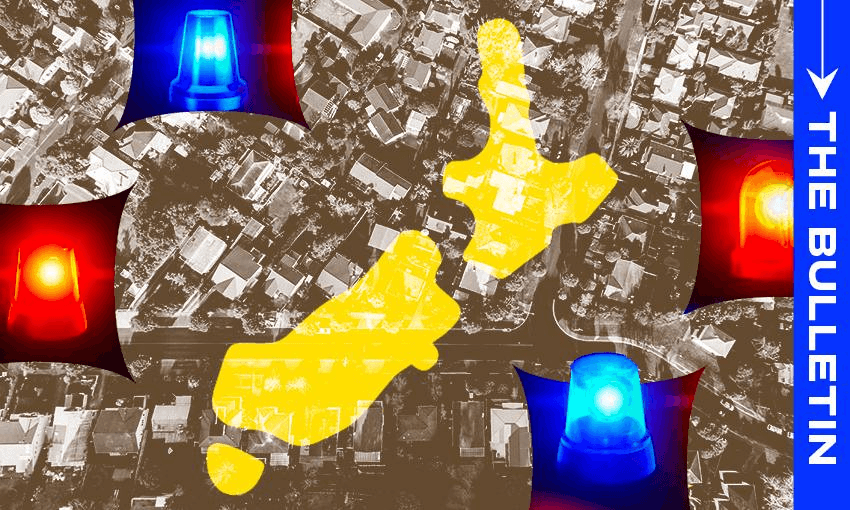New polling shows a significant drop in people saying law and order is a top concern. Perception might be reality, writes Anna Rawhiti-Connell in this excerpt from The Bulletin, The Spinoff’s morning news round-up. To receive The Bulletin in full each weekday, sign up here.
Concern about law and order drops to lowest levels since May 2022
It was political strategist Lee Atwater who said, “Perception is reality”. Atwater worked as a Republican political operative with Bush and Reagan. The phrase is particularly cynical in a political context, and the mildest thing you might read about Atwater is that “he displayed more than a tinge of amorality.” He is not the topic of discussion today, but his words came to mind yesterday when looking over the latest Ipsos Issues Monitor results and a couple of crime and justice stories yesterday. The Ipsos results show crime/law & order has “significantly fallen in prominence as an issue” to be the fourth highest issue New Zealanders are concerned about at 27%, its lowest level since May 2022. It’s been number two since May 2023, peaking at 40%, which was its fourth consecutive high since the Ipsos Monitor began in 2018. It was sitting at 16% in February 2021. Toby Manhire zeroed in on the Ipsos survey results in June last year, and this is no rocket science from me, but you can view it as a pretty good precursor to what played out at the election.
Gap widens between National and Labour on handling issue
Overall, while the Ipsos polling gives National comfort on how people view its law and order credentials, the government’s performance was rated 4.6, which is just a bit above the 4.5 given to the last government before the election. The Ipsos polling is particularly useful in evaluating people’s perception of which party is best equipped to handle particular issues. “Tough on crime” is traditional National territory, and the party has consistently come out on top for law and order since February 2022. The gap between them and Labour was previously at its widest in recent times in August 2023, with 16 points between the two. There are now 22 points between the two parties. Labour was accused of not taking people’s concerns seriously last year, and there was a late-breaking move to introduce a law specific to ram raids, which is now at the Select Committee stage. It’s not popular with legal experts and those who work with youth offenders and was deemed inconsistent with the Bill of Rights Act last year by then-Attorney General David Parker. Andrew Geddis mentions a suggestion from a legal academic that a similar conclusion in the context of the gang patch ban legislation might represent a “‘badge of honour’ in that it announces to the world that the government is really serious about cracking down (or similar rhetoric).”
Continuing upward trend in sexual and violent crime data
What of actual crime statistics? As incredibly well explained by Chris Knox and Michael Neilson last year for the Herald (paywalled), this is complicated territory. The Herald’s Derek Cheng reported yesterday that the latest crime statistics show a spike in the number of robberies, burglaries and theft by children or young people, continuing an upward trend in youth crime since 2021. Cheng is also regularly circumspect about crime statistics, noting yesterday’s release of data from the Ministry of Justice “does not necessarily show whether actual crime is rising or falling” but “looking at the data over time can indicate trends” and “overall there is a continuing upward trend in sexual and violent crime data – including family violence.” The Ipsos polling period is only a week in late February, and the crime data is for the year ending December 2023, but unless we all observed a dramatic and unproven drop in crime in January and February, perception about the party best equipped to handle the issue and concerted moves to demonstrate action, no matter the questions about their real efficacy, are probably playing a role in reducing our levels of concern about crime.
Justice system under pressure as warning issued over backroom hiring freeze for police
A second story from Derek Cheng yesterday on the briefing from the Chief Justice (paywalled) to Attorney-General Judith Collins reveals a justice system still under immense pressure, a story that’s been running for quite some time. Cheng writes that Dame Helen Winkelmann’s briefing “paints a bleak picture of the challenges to properly resource the judiciary.” The justice sector, including the courts, is operating under the same directive from the government as the rest of the public service and needs to find 6.5% in savings. Winkelmann had asked for the courts, as “essential front-line services”, to be exempt. This morning The Herald is reporting that the Police Association, currently at loggerheads with the government over pay negotiations, is warning that a hiring freeze on backroom staff is “already causing backlogs and delays and will make it harder for the Government to implement its ‘tough on crime’ policy agenda.”


